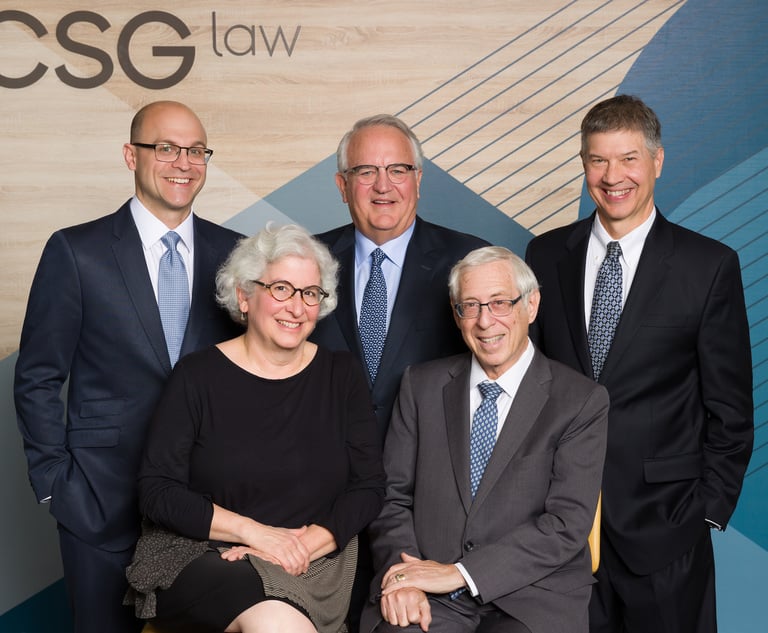 Lori Waldron of Sills Cummis & Gross
Lori Waldron of Sills Cummis & GrossLori Waldron of Sill Cummis Takes Helm of Life Sciences Practice in 2018
"As co-chair, I have the privilege of leading and navigating a group of very skilled transactional attorneys through a wide variety of complex acquisitions, divestitures, licensing transactions and other strategic collaborations."
June 10, 2019 at 06:07 PM
4 minute read
Lori Waldron of Sills Cummis & Gross in Newark had an eventful 2018. In addition to becoming co-chair of her practice group, she handled numerous significant deals, including her representation of Progenics Pharmaceuticals Inc. in an exclusive license agreement with Curium Netherlands Holding B.V. in connection with a Progenics oncology imaging agent. She “has tripled her book of business over the last two years,” a colleague said. “Lori spent part of her career in-house and understands the pressures in-house lawyers and businesspeople face. This experience gives Lori insight that a lot of lawyers are missing—she is a businessperson as much as she is a lawyer, allowing her to get deals done for her clients.”
What were some of your most satisfying successes of 2018, and why?
In 2018, I was named co-chair of my firm's Life Sciences Practice Group. I am very proud of this accomplishment because it is a culmination of over 25 years of hard work and dedication to both my legal practice and my clients. In order to get to this place in my career, I have devoted countless hours to the life sciences practice, including participating and speaking at industry events, publishing numerous articles, furthering my industry-specific legal education, and serving, for several years, as a leader of the New Jersey chapter of the Licensing Executives Society. As co-chair, I have the privilege of leading and navigating a group of very skilled transactional attorneys through a wide variety of complex acquisitions, divestitures, licensing transactions and other strategic collaborations. I have been able to help grow the practice, both by bringing in new clients and by continuing to assist existing clients.
What recent economic factors have affected your practice area?
As a life sciences attorney, I am fortunate that Sills Cummis & Gross sits geographically in the heart of the metropolitan life sciences industry. With offices in Newark, Princeton and New York, I am a step away from hundreds of pharma and biotech businesses and executives. This, coupled with the thriving economy and the continual development of new medical drugs and devices, has been very good for business. We have seen a significant upturn in both the “big deals” such as M&A and the “day-to-day” work serving as outside general counsel to our corporate clients.
Amid a changing market for legal services, what does it take to become a trusted transactional lawyer in New Jersey?
In order to become a trusted transactional lawyer, it is imperative that an attorney be able to provide comprehensive business advice, in addition to comprehensive legal advice. Pharmaceutical and biotech businesses, in particular, can be quite technical and complicated in nature. In order to stay abreast of my clients' businesses and products, I routinely read pharmaceutical journals and attend science seminars and courses. I am thus able to provide my clients with well-rounded, complete legal advice to meet their business objectives.
A prospective client in crisis calls and asks why your team should be retained. What is your answer?
As a dealmaker, one of my objectives is to assure that my clients avoid crisis. A good dealmaker does not actually have a crystal ball but, nonetheless, will be able to regularly predict when problems could arise and will know how to avoid or combat them. Over the years, I have seen problems arise in the early stages of transactions (for instance, involving due diligence) and in the later stages of transactions (for instance, involving a hostile stockholder). In any event, each situation must be handled with care. I make sure that I understand my client's needs and priorities, think outside of the box and come up with creative solutions to help ensure a crisis does not occur with the transaction.
This content has been archived. It is available through our partners, LexisNexis® and Bloomberg Law.
To view this content, please continue to their sites.
Not a Lexis Subscriber?
Subscribe Now
Not a Bloomberg Law Subscriber?
Subscribe Now
NOT FOR REPRINT
© 2024 ALM Global, LLC, All Rights Reserved. Request academic re-use from www.copyright.com. All other uses, submit a request to [email protected]. For more information visit Asset & Logo Licensing.
You Might Like
View All
Appellate Div. Follows Fed Reasoning on Recusal for Legislator-Turned-Judge
4 minute read
Chiesa Shahinian Bolsters Corporate Practice With 5 From Newark Boutique
5 minute read
'A Mockery' of Deposition Rules: Walgreens Wins Sanctions Dispute Over Corporate Witness Allegedly Unfamiliar With Company

$113K Sanction Award to Law Firm at Stake: NJ Supreme Court Will Consider 'Unsettled Law' Frivolous Litigation Question
4 minute readTrending Stories
- 1DOJ Asks 5th Circuit to Publish Opinion Upholding Gun Ban for Felon
- 2GEO Group Sued Over 2 Wrongful Deaths
- 3Revenue Up at Homegrown Texas Firms Through Q3, Though Demand Slipped Slightly
- 4Warner Bros. Accused of Misleading Investors on NBA Talks
- 5FTC Settles With Security Firm Over AI Claims Under Agency's Compliance Program
Who Got The Work
Michael G. Bongiorno, Andrew Scott Dulberg and Elizabeth E. Driscoll from Wilmer Cutler Pickering Hale and Dorr have stepped in to represent Symbotic Inc., an A.I.-enabled technology platform that focuses on increasing supply chain efficiency, and other defendants in a pending shareholder derivative lawsuit. The case, filed Oct. 2 in Massachusetts District Court by the Brown Law Firm on behalf of Stephen Austen, accuses certain officers and directors of misleading investors in regard to Symbotic's potential for margin growth by failing to disclose that the company was not equipped to timely deploy its systems or manage expenses through project delays. The case, assigned to U.S. District Judge Nathaniel M. Gorton, is 1:24-cv-12522, Austen v. Cohen et al.
Who Got The Work
Edmund Polubinski and Marie Killmond of Davis Polk & Wardwell have entered appearances for data platform software development company MongoDB and other defendants in a pending shareholder derivative lawsuit. The action, filed Oct. 7 in New York Southern District Court by the Brown Law Firm, accuses the company's directors and/or officers of falsely expressing confidence in the company’s restructuring of its sales incentive plan and downplaying the severity of decreases in its upfront commitments. The case is 1:24-cv-07594, Roy v. Ittycheria et al.
Who Got The Work
Amy O. Bruchs and Kurt F. Ellison of Michael Best & Friedrich have entered appearances for Epic Systems Corp. in a pending employment discrimination lawsuit. The suit was filed Sept. 7 in Wisconsin Western District Court by Levine Eisberner LLC and Siri & Glimstad on behalf of a project manager who claims that he was wrongfully terminated after applying for a religious exemption to the defendant's COVID-19 vaccine mandate. The case, assigned to U.S. Magistrate Judge Anita Marie Boor, is 3:24-cv-00630, Secker, Nathan v. Epic Systems Corporation.
Who Got The Work
David X. Sullivan, Thomas J. Finn and Gregory A. Hall from McCarter & English have entered appearances for Sunrun Installation Services in a pending civil rights lawsuit. The complaint was filed Sept. 4 in Connecticut District Court by attorney Robert M. Berke on behalf of former employee George Edward Steins, who was arrested and charged with employing an unregistered home improvement salesperson. The complaint alleges that had Sunrun informed the Connecticut Department of Consumer Protection that the plaintiff's employment had ended in 2017 and that he no longer held Sunrun's home improvement contractor license, he would not have been hit with charges, which were dismissed in May 2024. The case, assigned to U.S. District Judge Jeffrey A. Meyer, is 3:24-cv-01423, Steins v. Sunrun, Inc. et al.
Who Got The Work
Greenberg Traurig shareholder Joshua L. Raskin has entered an appearance for boohoo.com UK Ltd. in a pending patent infringement lawsuit. The suit, filed Sept. 3 in Texas Eastern District Court by Rozier Hardt McDonough on behalf of Alto Dynamics, asserts five patents related to an online shopping platform. The case, assigned to U.S. District Judge Rodney Gilstrap, is 2:24-cv-00719, Alto Dynamics, LLC v. boohoo.com UK Limited.
Featured Firms
Law Offices of Gary Martin Hays & Associates, P.C.
(470) 294-1674
Law Offices of Mark E. Salomone
(857) 444-6468
Smith & Hassler
(713) 739-1250






